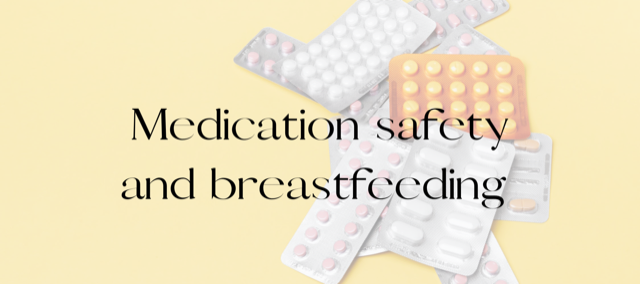Most medications pass into breastmilk, although the exact percentage of transfer varies greatly between medication types.
When a drug is administered, its concentration will peak in the blood a short time later (depending on how fast the mother metabolises medications). This metabolising can be impacted by a range of factors such as:
- Type/route of administration
- Dose/Frequency/Duration
- Bioavailability and absorption profile
- Molecular weight of the drug
- Half-life (time it takes for the drug to metabolise by half its concentration in the body)
With any medication you take you should take special consideration if your baby is premature, unwell and/or taking any medications themselves. If ever unsure, its best to check with your healthcare provider first.
Post birth pain relief
While many women have a reasonably smooth recovery post birth, others may experience health complications and pain requiring pain relief. These mothers should not have to suffer ongoing pain even if they are breastfeeding.
Extensive evidenced based research has been conducted into the usage of over-the-counter and prescribed pain medications during breastfeeding.
Low risk classification: compatible with breastfeeding, research suggests excretion levels are low in breastmilk when used appropriately.
- Paracetamol
- Ibuprofen
- Diclofenac (voltaren)
- Celecoxib (slow-release anti-inflammatory)
Possible risk classification: use caution, compatible in short-term hospital-based use with small doses and close baby monitoring.
- Naproxen
- Codeine
- Fentanyl
- Morphine
- Tramadol
- Oxycodone (endone)
SSRI’s (anti-depressants)
Pregnancy does not protect or resolve mental illness. The risks of untreated depression can include poor nutrition and high-risk behaviours such as abuse of alcohol/illicit substances. Risks to the baby include poor growth, increased risk of premature birth and poor long-term outcomes. Therefore, in the majority of cases – the continued use of anti-depressants during pregnancy and breastfeeding is recommended.
Whilst most common anti-depressants such as sertraline, citalopram and fluvoxamine are considered to be low risk classifications, others can be recognised as possible risk and should be discussed with individual healthcare providers.
Some other Breastfeeding ‘safe’ medications:
- Antibiotics – Most antibiotics safe and vital to fight infection. (Metronidazole may make the breastmilk taste bitter)
- Asthma inhalers – Most inhalers (treatment and prevention) are safe to use while breastfeeding
- Cold & Flu Meds – nasal sprays, cold and flu lozenges/gargles and cough syrups usually safe. AVOID: any medications containing pseudoephedrine and iodine.
- Hay fever antihistamines – non drowsy antihistamines as well as nasal sprays/eye drops are considered safe.
- Oral Contraceptives – The progesterone only (mini-pill) considered best. Combined oral contraceptives may affect your milk supply
Medications not recommended during breastfeeding
- Some medications used for irregular heart rhythms and other cardiac conditions
- Some chemotherapy medications
- Some acne medications
- Lithium, as used for mental health disorders
- Injectable contrast dye used for radio imaging (MRI, CT scans)
Are complementary medicines safer than prescribed medicines?
Despite the media attention, ‘natural’ does not necessarily mean safe. All drugs, no matter if their source is plant based or synthetic – have a chemical structure and associated solubility in breastmilk. For example, vitamins such as vitamin D or A are fat soluble, so they have higher excretion levels in breastmilk in comparison to vitamin C or B which are water soluble.
The biggest barrier to the safety of complementary medicine is the limited scientific based research in published evidence.
Where can you find out?
(ACT) NPS Medicines Line: 1300 633 424
(NSW) MotherSafe: Royal Hospital for Women: 1800 647 848
(QLD) NPS Medicines Line: 1300 633 424
(SA) Medicines Information Centre WCH: 08 8161 7222
(TAS) NPS Medicines Line: 1300 633 424
(VIC) Medicine Information Line, Monash Medical Centre: 03 9594 2361
(WA) Women & Newborn Health Services (KEMH): 08 6458 2723
Online Resources:
- Lactmed (free online database with information on drugs and lactation)
- Breastfeeding and Drugs - Queensland Government
- Medicines in breastfeeding - Royal Women's Hospital
Written by Keryn Thompson, RM & IBCLC (L-301766)
References:
(LactMed), D., 2021. Drugs and Lactation Database (LactMed). [online] Ncbi.nlm.nih.gov. Available at: <https://www.ncbi.nlm.nih.gov/books/NBK501922/> [Accessed 19 April 2021].
Davanzo, R., Bua, J., De Cunto, A., Farina, M., De Ponti, F., Clavenna, A., Mandrella, S., Sagone, A. and Clementi, M., 2015. Advising Mothers on the Use of Medications during Breastfeeding. Journal of Human Lactation, 32(1), pp.15-19.
Hale, T., 2003. Medications in Breastfeeding Mothers of Preterm Infants. Pediatric Annals, 32(5), pp.337-347.
HALE, T., 2004. Maternal Medications During Breastfeeding. Clinical Obstetrics and Gynecology, 47(3), pp.696-711.
Howard, C. and Lawrence, R., 1999. Drugs and Breastfeeding. Clinics in Perinatology, 26(2), pp.447-478.
Rowe, H., Baker, T. and Hale, T., 2015. Maternal Medication, Drug Use, and Breastfeeding. Child and Adolescent Psychiatric Clinics of North America, 24(1), pp.1-20.
Spencer, B., 2015. Medications and Breastfeeding for Mothers With Chronic Illness. Journal of Obstetric, Gynecologic & Neonatal Nursing, 44(4), pp.543-552.
Spiesser-Robelet, L., Brunie, V., de Andrade, V. and Gagnayre, R., 2016. Knowledge, Representations, Attitudes, and Behaviors of Women Faced With Taking Medications While Breastfeeding. Journal of Human Lactation, 33(1), pp.98-114.



